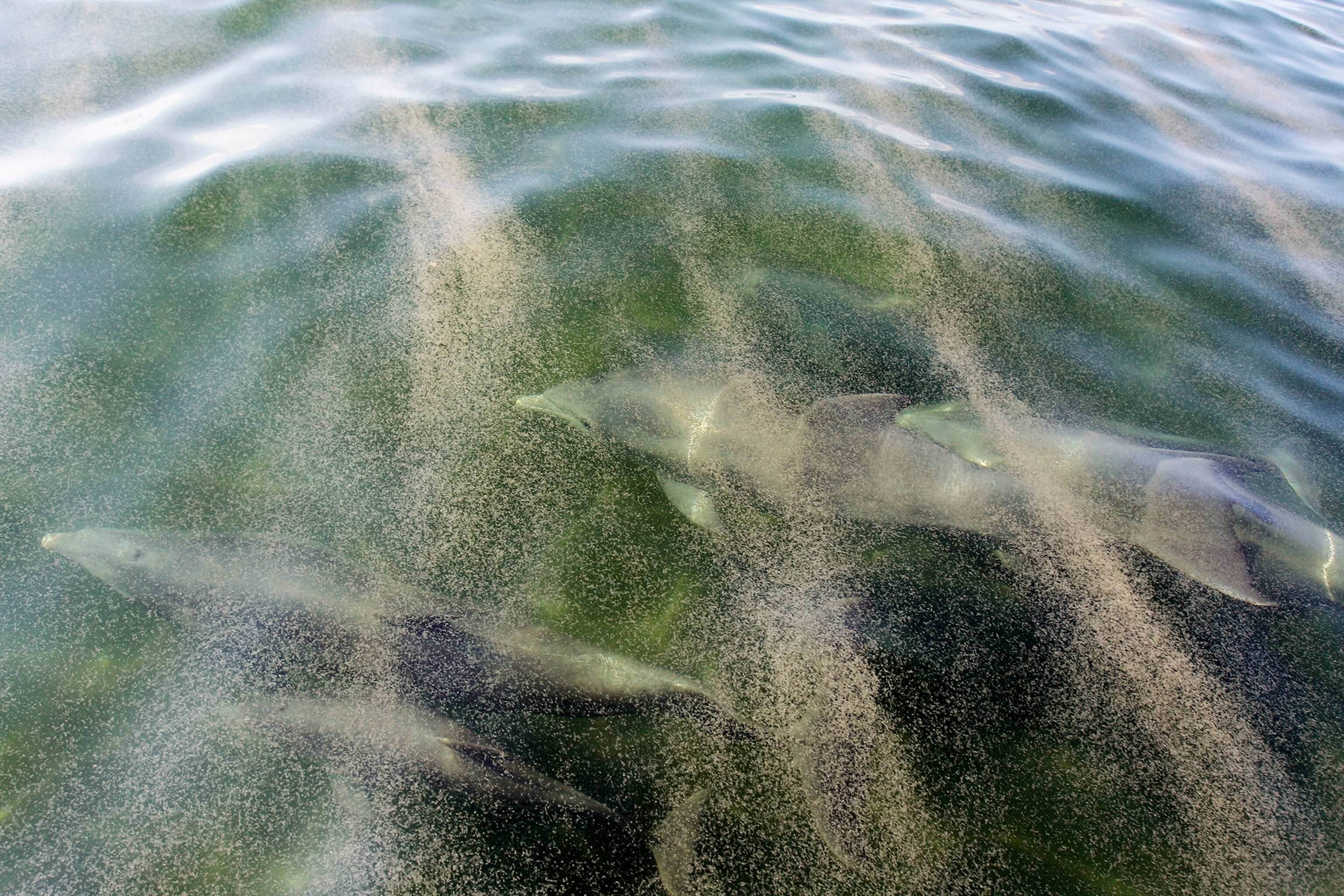
Gulf Oil Spill "Not Over": Dolphins, Turtles Dying in Record Numbers
Report warns that 14 species are still struggling from the 2010 disaster.
Four years after the biggest oil spill in U.S. history, several species of wildlife in the Gulf of Mexico are still struggling to recover, according to a new report released today.
In particular, bottlenose dolphins and sea turtles are dying in record numbers, and the evidence is stronger than ever that their demise is connected to the spill, according to Doug Inkley, senior scientist for the National Wildlife Federation, which issued the report. (See "Gulf Oil Spill: One Year Later.")
The Deepwater Horizon oil rig exploded on April 20, 2010, killing 11 people and spewing more than 200 million gallons (750 million liters) of oil into the Gulf of Mexico. Since then, various government agencies and nonprofits, including the National Wildlife Federation, have been studying the region's wildlife to track the impacts of the oil.

The report, a compilation of published science since the spill, reveals that "the Gulf oil spill is far from over," Inkley said.
"The oil is not gone: There is oil on the bottom of the Gulf, oil is washing up on the beaches, and oil is still on the marshes," he said.
"I am not surprised by this. In Prince William Sound, 25 years after the wreck of Exxon Valdez, there are still some species that have not fully recovered." (Related: "Oil From the Exxon Valdez Spill Lingers on Alaska Beaches.")
However, BP, which operated the now-defunct oil well, claims that the report "is a piece of political advocacy—not science.
"For example, the report misrepresents the U.S. government's investigation into dolphin deaths; as the National Oceanic and Atmospheric Administration's own Web site states, that inquiry is ongoing," BP said in a statement provided to National Geographic.
"The report also conveniently overlooks information available from other independent scientific reports showing that the Gulf is undergoing a strong recovery. Just this week, a study published by Auburn University researchers found no evidence that the spill impacted young red snapper populations on reefs off the Alabama coast."
Hit Hard
The report examined 14 species that live in the Gulf. Those include:
—More than 900 bottlenose dolphins have been found dead or stranded in the oil spill area since April 2010. If you stretched the corpses lengthwise, that's 1.5 miles (2.4 kilometers) of dead dolphins, Inkley said. Scientists know that is more than in previous years because they've been recording deaths and strandings in the Gulf for a decade.
Ongoing research also shows that dolphins swimming in oiled areas are underweight, anemic, and showing signs of liver and lung diseases. (Related: "U.S. Dolphin Deaths Rise to 300; Cause Still a Mystery.")
A top predator like the dolphin falling ill is a sign that species further down the food chain are also having trouble, Inkley said.
"When you have sick dolphins, it tells you there's a problem here and it needs to be investigated."
—There are five species of sea turtle that live in the Gulf, and all of them are listed as threatened or endangered by the Endangered Species Act. About 500 dead sea turtles have been found in the spill region every year since 2011—"a dramatic increase over normal rates," according to the NWF. What's unknown is how many turtles died at sea and were never recovered by scientists.
—An oil chemical from the spill has been shown to cause irregular heartbeats in the embryos of bluefin and yellowfin tuna. That's a critical stage of development for the fish, so there's a lot of concern that the damage could cause heart attacks or deaths, Inkley said. (Related: "Odd Animal Deaths, Deformities Linked to Gulf Oil Spill?")
—Loons, birds that winter on the Louisiana coast, are carrying increasing concentrations of toxic oil compounds in their blood.
—Sperm whales that swam near the BP well have higher levels of DNA-damaging metals in their bodies than in the past. The metals in their bodies, such as chromium and nickel, are the same ones that were present in the well.
Long Way to Go
Overall, "we have a long way to go in understanding the full impact," Inkley said.
To that end, NWF and the U.S. National Oceanic and Atmospheric Administration will continue monitoring wildlife in the oiled region—the latter is required to do so by the Oil Pollution Act.
Restoring the oiled ecosystems is a goal, Inkley said, but he added oil is tough to remove, especially in marshes and in the deep ocean. That's why NWF is emphasizing prevention—in particular, adopting alternative energy resources that are not carbon-based and won't cause oil spills.
"I'm still haunted by the 'walking dead' brown pelicans covered head to toe in the oil," added Inkley.
"We must not let this happen again."
Read the full text of the report below.